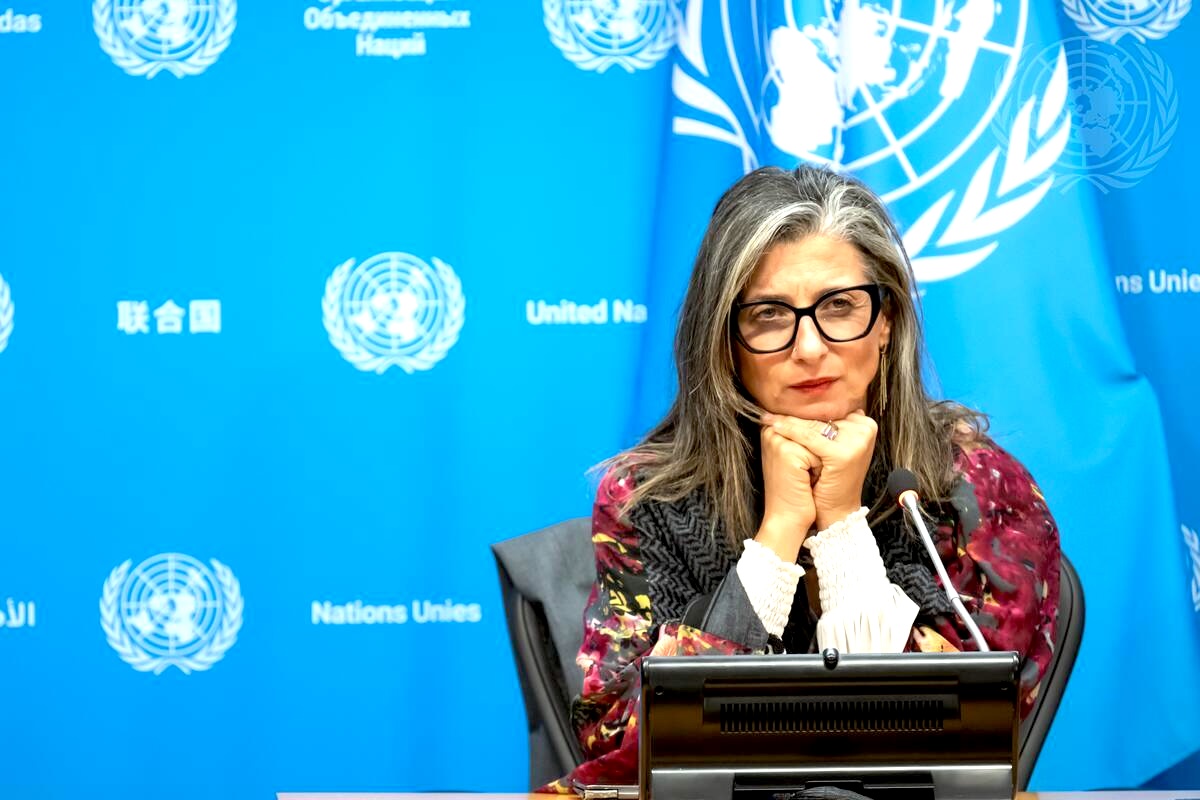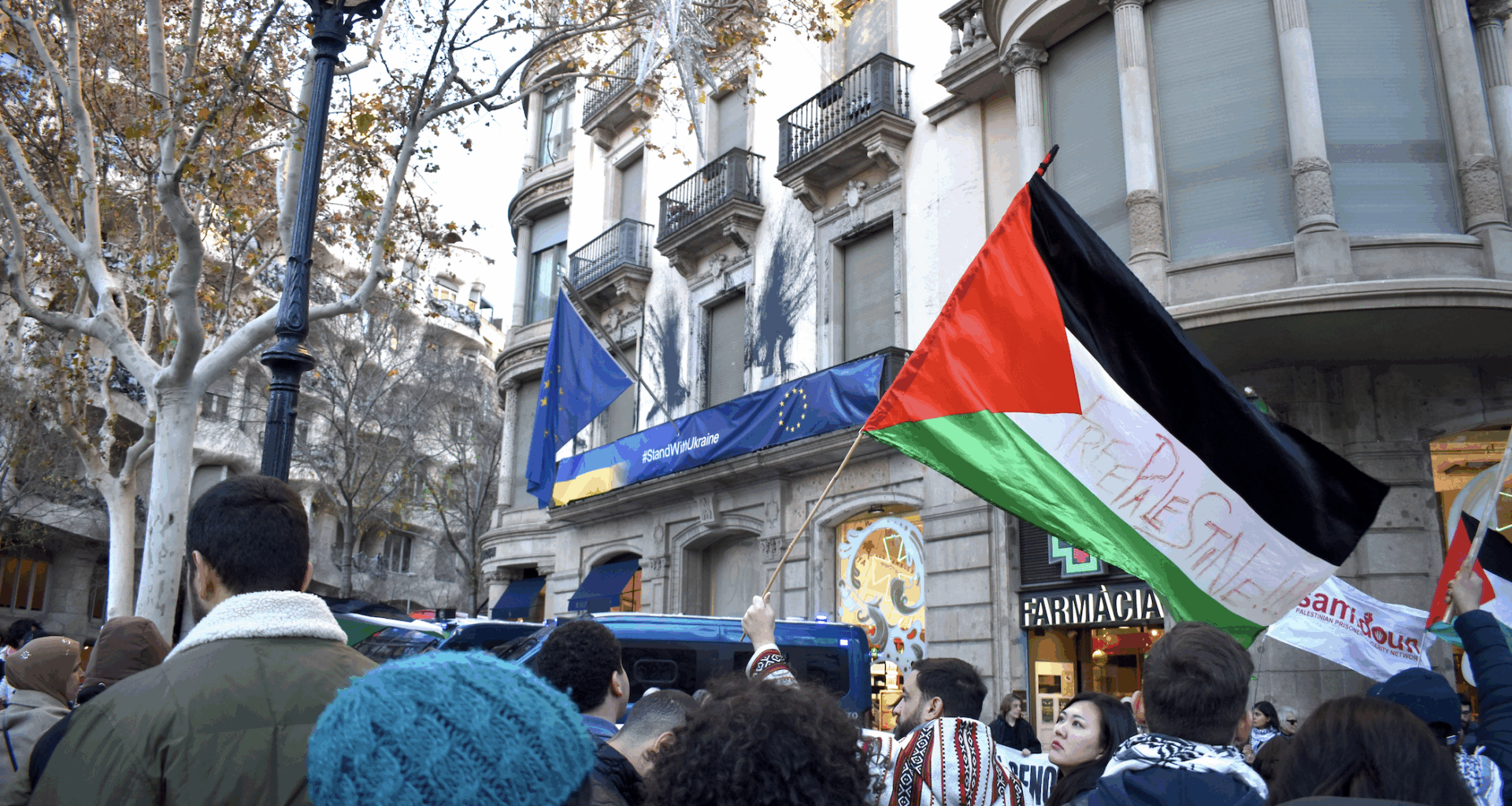
Palestine solidarity protest in front of the European Commission branch in Barcelona, Jan. 7, 2024. (Aniol/Wikimedia Commons/CC0)
By Medea Benjamin
Common Dreams
 While the U.S. government has given Israel carte blanche to commit genocide, many of us held out hope that Europe would be different — more principled, more bound by its own human rights commitments.
While the U.S. government has given Israel carte blanche to commit genocide, many of us held out hope that Europe would be different — more principled, more bound by its own human rights commitments.
But Europe has proven no better; it has been complicit through trade deals, a steady flow of weapons, and brutal crackdowns on pro-Palestine protesters across the continent.
At the July 15 meeting of the European Union-Israel Association Council, European foreign ministers had a chance to act, but they refused to take punitive action under the agreement’s human rights clause.
Instead of imposing sanctions or halting arms sales, Europe offers tax breaks, preferential market access, and diplomatic legitimacy. And while European officials justified this by saying Israel had agreed to allow more humanitarian aid into Gaza, Israel is still starving people to death and forcing the children it has maimed to undergo amputations with no anesthetics.
Under international law — including the E.U.’s own human rights clauses — Europe is obligated to suspend agreements with countries committing grave violations. Yet it continues to benefit from Israeli technology, weapons, and surveillance systems — many of them field-tested on Palestinian civilians.
United Nations Special Rapporteur Francesca Albanese condemned Europe’s inaction, calling it a violation of both legal and moral duties. She had urged the E.U. to suspend the trade agreement.
The impact of the suspension would have been enormous because the E.U. is not only Israel’s largest trading partner, but also its largest investment partner, investing nearly twice as much as the U.S.
“It is absolutely sickening that the E.U. leadership rewarded this country with more economic partnership instead of putting an end to the genocide,” Albanese said.
Biggest Trading Partner

Albanese during a press briefing at U.N. headquarters in New York on Oct. 30, 2024. (UN Photo/Mark Garten)
Despite the horrors in Gaza, the E.U. remains Israel’s largest trading partner — accounting for over $46 billion in goods traded in 2024, nearly a third of Israel’s global commerce.
Several E.U. countries maintain especially strong ties with Israel through military, economic, and diplomatic channels. Germany stands out as the most significant partner, supplying over $355 million in arms in 2023 — including submarines and tank engines — and ranking as Israel’s second-largest global arms supplier.
Italy and France maintain long-standing military ties as well. Italy is the E.U.’s third-largest arms exporter to Israel, while France exported approximately $182 million in military equipment in 2023 before partially suspending sales under mounting public pressure.
Beyond arms, the Netherlands is Israel’s largest European investor, responsible for two-thirds of E.U. capital flowing into Israeli industries. Greece has also deepened its strategic partnership with Israel, holding joint military exercises and advancing energy cooperation.
Hungary consistently shields Israel diplomatically within the E.U., blocking critical statements and threatening to withdraw from forums that try to hold Israel accountable. Austria brands itself a “strategic partner,” maintaining close political and trade links.
Despite the horrors in Gaza, the E.U. remains Israel’s largest trading partner — accounting for over $46 billion in goods traded in 2024, nearly a third of Israel’s global commerce.
While some countries, including Ireland, Spain, and several in Scandinavia, advocate sanctions and accountability, powerful E.U. members like Germany, Hungary, and the Netherlands are instead doubling down on ties with Israel.
EU Citizens Revolt
On the other hand, European citizens have been rising up in all manner of creative ways. Millions have taken to the streets in mass demonstrations.
In the U.K., monthly protests have drawn crowds of up to 300,000. “Red Line” marches in The Hague and Brussels gathered between 100,000 and 150,000 people, clad in red to symbolize a moral boundary crossed.
Huge rallies have filled Berlin, Bern, and Paris with tens of thousands chanting for Gaza and demanding an end to military collaboration with Israel.
150,000 people took part in the Red Line protest in The Hague, against Israel’s violence in Gaza.
Dressed in red, crowds marched through the city, past the International Court of Justice, drawing a symbolic “red line” against the Dutch government’s support for Israel pic.twitter.com/QcOBPdLSJS
— Middle East Eye (@MiddleEastEye) June 15, 2025
Polls across Europe show plummeting support for Israel. Majorities in Germany, France, and the U.K. oppose its assault on Gaza and support an immediate cease-fire. In six key countries, only 6 percent to 16 percent support Israel’s actions. Up to 65 percent of respondents back an arms embargo and support prosecuting Israeli leaders for war crimes.
Crackdowns in Response
But instead of heeding this public outcry, many European governments have cracked down on protesters.
The U.K. banned the direct-action group Palestine Action under anti-terror laws and has arrested over 100 people, including elderly demonstrators, for simply holding signs saying: “I oppose genocide. I support Palestine Action.”
France has banned rallies and deployed riot police. Germany has prohibited Palestinian flags, shut down protests, and initiated deportations.
Austria has criminalized slogans like “From the river to the sea.” In Hungary, authorities have equated solidarity protests with terrorism.
Across the continent, governments are not listening to their people — they are working hard to silence them.
The Choice
Europe has a choice. It could follow the will of its citizens. At the recent trade meeting, it could have taken a stand. Instead, it is choosing profits over Palestinian lives.
History will not just remember Israel’s crimes — but those, including the so-called Western democracies that enabled them.
Medea Benjamin is the co-founder of CODEPINK and the co-founder of the human rights group Global Exchange. She has been an advocate for social justice for more than 40 years. She is the author of 10 books, including Drone Warfare: Killing by Remote Control; Kingdom of the Unjust: Behind the US-Saudi Connection; and Inside Iran: The Real History and Politics of the Islamic Republic of Iran. Her articles appear regularly in outlets such as Znet, The Guardian, The Huffington Post, CommonDreams, Alternet and The Hill.
This article is from Common Dreams.
The views expressed are solely those of the author and may or may not reflect those of Consortium News.
Donate to CN’s
2025 Summer
Fund Drive


